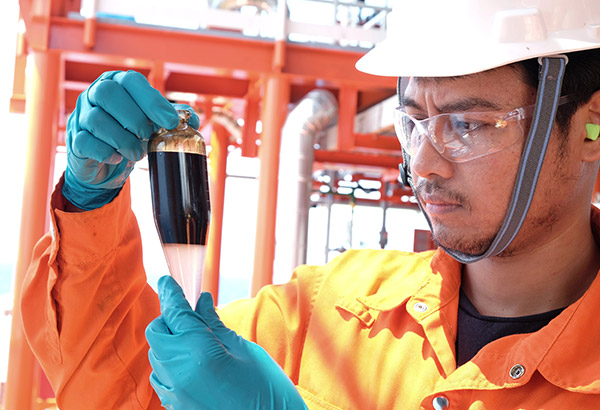نظرة عامة على البرنامج:
تعد المعرفة العميقة بمواصفات منتجات الوقود وتحليلها ومراقبة الجودة ضرورية لفهم تأثيرها على أداء المحرك. بالإضافة إلى ذلك ، يعد الاستخدام الفعال لموظفي ومعدات المختبرات لضمان المعالجة المثلى للنفط الخام لتلبية مواصفات منتجات وقود العميل هدفًا مهمًا.
تم تطوير هذه الدورة التدريبية لتوفير معرفة عميقة ومراجعة عملية لـ “نظام مراقبة جودة الوقود” في المصافي. محتوى البرنامج شامل وواسع النطاق. يغطي نهج دراسة الحالة بعض فحوصات النفط الخام المحددة ، ومواصفات المنتج ، ومنهجية أخذ العينات ، والطرق التحليلية ومراقبة الجودة.
الذي ينبغي أن يحضر؟
• مهندسو التشغيل والموظفون
• مهندسي الإنتاج
• مهندسو العمليات
• طاقم الإشراف الفني
• المهندسين المعماريين
• متخصصو جودة الوقود
• مشغلي القياس ومراقبة الجودة
• رؤساء العمال
Instructor:
Duration: 05 days
Objectives:
- Describe fuels chemistry, manufacturing, blending, distribution, and handling.
- Compare testing parameters for gasoline, jet fuel, and diesel.
- Apply combustion parameters to fuels.
- Explain how fuel properties influence engine performance.
- Manage jet fuel quality by applying principles of handling and microbial degradation.
- Explain diesel properties and their impact on fuel performance.
- Troubleshoot quality problems and contamination of fuels.
- Discuss fuel quality monitoring system.
- Address specific problems in distribution and fuel testing and propose solutions
Contents & Outlines:
Day One: Introduction of Fuel Quality Basics
- Crude oil chemistry and properties
- Classification of crude oils
- Crude assays and valuation
- Petroleum product specifications
- Petroleum products standardization and quality control
- Introduction to oil refineries
- Refinery configurations
- Workshop and Case Study
Day Two: Gasoline
- Gasoline chemistry
- Manufacturing technologies
- Gasoline specifications and quality monitoring system
- Testing parameters for gasoline
- Composition, Combustion Characteristics, Octane Number, Corrosiveness, Density, Flash Point and Fire Point, Oxygenates, Stability, and Instability, Volatility
- Effect of fuel properties on engine performance
- Troubleshoot quality problems and contamination of gasoline
- Workshop and Case Study
Day Three: Jet Fuel
- Jet fuel chemistry
- Manufacturing technologies
- Jet fuel specifications and quality monitoring system
- Testing parameters for Jet fuel
- Acidity, Calorific Value, Density, Flash Point, Freezing Point, Storage Stability, Thermal Stability, Viscosity, Volatility, Water
- Effect of fuel properties on engine performance
- Troubleshoot quality problems and contamination of jet fuel
- Workshop and Case Study
Day Four: Diesel
- Diesel fuel chemistry
- Manufacturing technologies
- Diesel fuel specifications and quality monitoring system
- Testing parameters for Diesel fuel
- Acidity, Sulfur content, Appearance and Odor, Ash, Calorific Value, Carbon Residue, Cetane Number and Cetane Index, Cloud Point, Composition, Diesel Index, Flash Point, Freezing Point, Neutralization Number, Pour Point, Stability, Viscosity, Volatility, Water and Sediment
- Effect of diesel fuel properties on engine performance
- Troubleshoot quality problems and contamination of diesel fuel
- Workshop and Case Study
Day Five: Fuel Quality Monitoring System
- Quality control of products in petroleum refining
- Gasoline Octane Blending
- Viscosity Blending
- Pour Point Blending
- Flash Point Blending
- Reid Vapor Pressure Blending for Gasoline and Naphthas
- Aniline Point Blending
- Sampling procedures
- Workshop and Case Study






